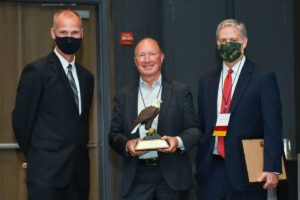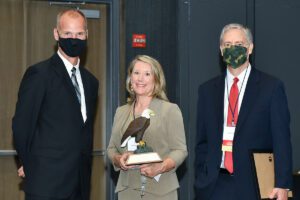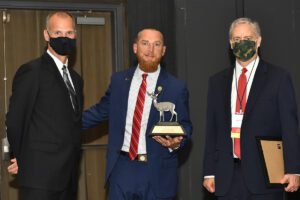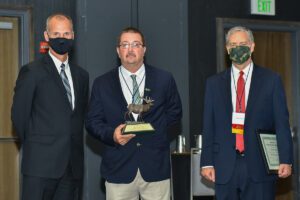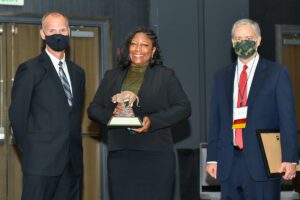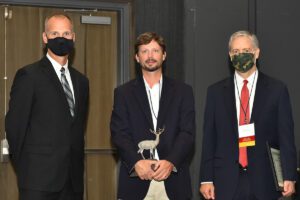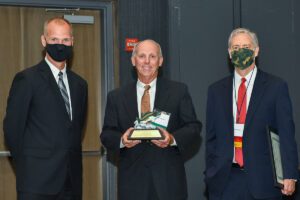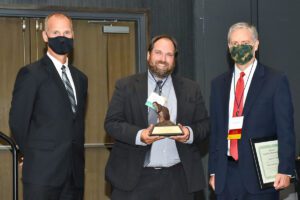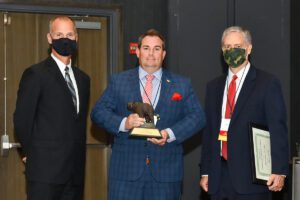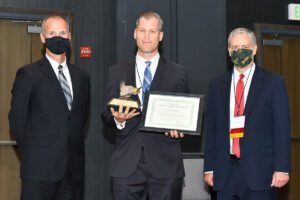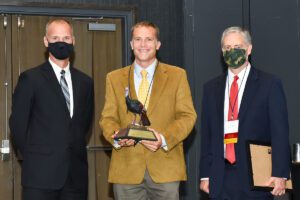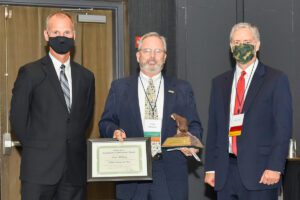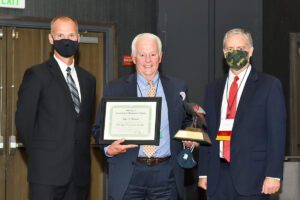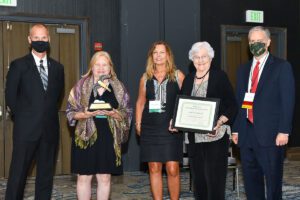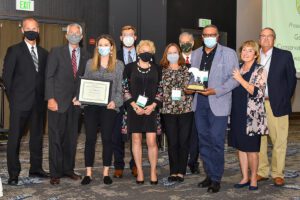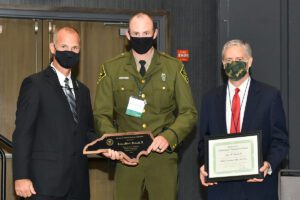NCWF Honors 18 Conservation Heroes at 57th Annual Governor’s Awards Banquet
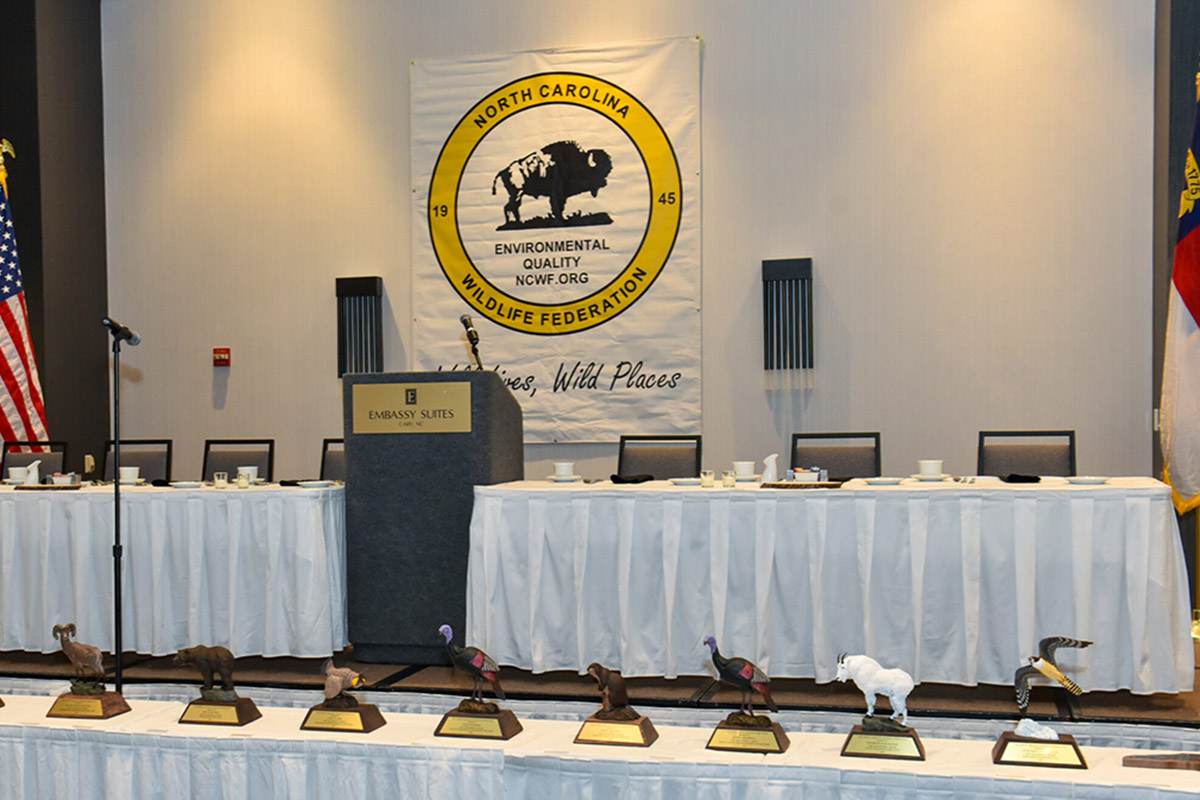

for Single Blog Post category
Animals are not brethren. They are not underlings. They are Other Nations, caught with ourselves in the net of life and time.
– Henry Beston, American writer and naturalist
Conservationists, such as those honored Sept. 11 with North Carolina Wildlife Federation’s 57th Annual Governor’s Conservation Achievement Awards, have long known how we treat those ‘other nations’ and the wild and untrodden places where they live is a mark of citizenship on our planet.
Our 2021 wildlife and habitat ambassadors recognize the challenge of managing public lands that are filling up with new hikers, campers, birders, paddlers, hunters and anglers. Yet, they also understand that newly minted outdoor enthusiasts present a powerful opportunity to expand North Carolina’s conservation constituency.
“The 18 agency professionals, elected officials, volunteers and organizations we celebrate tonight have been in the choir for the long haul,” said banquet emcee and award chair T. Edward Nickens during opening remarks to banquet attendees at the Embassy Suites in Cary. He added, “They’ve long loved the outdoors and cherished the wild lives that live just outside our windows. They are not newbies to a paddle or a fly rod. They understand their shared citizenship with the brook trout, the butterfly and the longleaf pine.”
Gov. Roy Cooper thanks conservation heroes for commitment to environment
NCWF Board Chair John Hairr and NC Wildlife Resources Commission Executive Director Cameron Ingram presented honorees with specially made wildlife statuettes following a thank you message from Gov. Roy Cooper.
“Your commitment to North Carolina’s wildlife, habitats and natural resources is clear, and our state is better off because of your work. Protecting our state’s natural resources is critical, not only for the beauty of our state but also for our economy,” Cooper said. “North Carolina has unique resources, and it’s important that we protect our state’s wildlife. By investing in clean water, expanding clean energy, and protecting waterways and greenways, North Carolina can continue to thrive.”
First presented in 1958, the Governor’s Conservation Achievement Awards are the highest natural resource honors given in the state. The annual program brings together diverse groups of conservationists to highlight wildlife conservation achievements to inspire others to take a more active role in protecting North Carolina’s natural resources for future generations.
2021 Winners of 57th Annual Governor’s Conservation Achievement Awards
Walter Foy Clark, Conservationist of the Year (Lansing)
Former Executive Director, Clean Water Management Trust Fund
“It would be difficult to find another person whose fingerprints are on as many wild acres, in as many wild places, in as wide a range of habitats, as Walter Clark,” Nickens. “Clark’s conservation legacy of overseeing the protection of thousands of acres – from the mountains to the coast – will forever remain on North Carolina’s landscape.”
Clark’s long tenure has centered on managing coastal wetlands, beaches, public trust waters and estuarine shorelines. For 24 years, he worked to protect North Carolina’s coast, first as an attorney with the Division of Coastal Management and then as a policy specialist with the NC Sea Grant program.
After purchasing the Old Orchard Creek Farm in Ashe County in 2003, he donated an easement to the farm to the Blue Ridge Rural Land Trust. For the next decade, Clark served as executive director of the land trust. Then in 2017, he took the helm of the Clean Water Management Trust Fund as executive director, where he served until his retirement this year.
At the banquet, Clark read a Francis Thompson quote, “All things by immortal power. Near or far, to each other linked are, that thou canst not stir a flower without troubling of a star,” and noted the importance of connectedness and intentional decisions.
“Tonight, when we all walk out of this room, whether you turn left or right will have consequences,” he said. “It seems like an inconsequential thing, but it will create a crescendo of events that will impact yourself and other people. And we’ve heard a lot tonight from people who have done that in their lives. They’ve been intentional about protecting our natural world.”
Dr. Matthew H. Godfrey, Wildlife Conservationist of the Year (Beaufort)
Biologist, NC Wildlife Resources Commission
Dr. Matthew H. Godfrey oversees 1,000-plus volunteers who monitor the state’s beaches for nesting and hatchling sea turtles.
“Under cover of darkness on foot and ATVs from the northern Outer Banks to the South Carolina state line, Dr. Godfrey’s thousand-strong force of citizen scientists and volunteers comb nearly every mile of the state’s beaches, marking and monitoring turtle nests,” said banquet emcee and awards chair T. Edward Nickens.
Additionally, Godfrey’s extended “eyes and hands” facilitate real-time responses to unusual occurrences affecting marine mammals, sea birds and other local wildlife by agencies, land and water managers, scientists and nonprofits.
Dr. Sara Schweitzer, assistant chief and coordinator of the commission’s wildlife diversity program, accepted the award on Godfrey’s behalf. She described him as quiet and whimsical and a man who enjoys sharing literature or poems before volunteer group meetings. At Godfrey’s request, Schweitzer read a poem from a marine conservation collection written by UK school children. “He said while poems about turtles tend to be subpar, there are some exceptions. Chloe, age 7, wrote this poem, and it’s entitled, In The Ocean,” she said.
Beneath our waters, green and cool, the marine turtles keep a swimming school. The oysters jig, the lobsters prance, the dolphins come and join the dance. But the jellyfish, who are rather small, can’t seem to learn the steps at all.
Chris Williams, Sportsman of the Year (Princeton)
Atlantic Flyway Regional Director, Delta Waterfowl
Raised in Garner, Williams joined Delta Waterfowl 20 years ago and has never left the front lines working for waterfowl and waterfowl hunters in North Carolina and beyond.
“Hunting for coastal diving ducks isn’t for the faint of heart. It’s a big water, big weather, big hopes, big ups and big downs kind of affair,” Nickens said. He added that Williams “works like a crazy man 12 months a year to keep our duck hunting heritage top of mind for legislators and elevated for all of us who thrill to cupped wings over the marshes.”
Williams said he’s a proud United States Army Police Veteran, a group of individuals who have spent their careers and volunteer service “assisting, protecting and defending what everybody in this room loves.”
He asked everyone in the room to take their passion for conservation, land, habitat, youth and North Carolina’s resources, “everything that each person in this room works day-in and day-out to preserve and cherish,” to keep it going.
John Isenhour, Land Conservationist of the Year (Salisbury)
Wildlife Biologist, North Carolina Wildlife Resources Commission
“From private landowners to educators to local officials, it seems like Isenhour has done far more than shepherd management plans for grasslands and hardwood forests and songbird habitat,” Nickens said. “He has shown thousands of North Carolinians, across the decades, that they hold power to lend nature a hand.”
Isenhour, who works primarily with private landowners to improve their land for wildlife, commended their sacrifice and initiative. He recognized his mom and siblings in attendance as a big part of his early introduction to conservation and the sacrifices they made being tenant farmers on a piece of property from 1919 to 1960.
Isenhour and his wife recently purchased the property, which will allow them to “positively experience true conservation” while they navigate their “home place in an ever-changing world.” He also thanked his high school teacher, friend and mentor for allowing him to “implement all kinds of crazy conservation trials” on his property. Isenhour has taken what he’s learned from those trials – good and bad – and passed that knowledge to other land tracts across the Piedmont.
Chandra Taylor, Water Conservationist of the Year (Chapel Hill)
Senior Attorney, Southern Environmental Law Center
Taylor, who specializes in water quality and environmental justice issues, is “a steadfast companion and counselor to many who are doing the important work of tying social justice to environmental protections,” said T. Edward Nickens, banquet emcee and NCWF awards committee chairman.
Working at the intersection of civil rights and environmental protection, Taylor forced cleanups at contaminated industrial sites at Yadkin River and Badin Lake, stopped water pollution threatening North Carolina communities, and helped shape transit and landfill policies.
At the banquet, Taylor thanked the organizations, community associations, and nonprofits for their willingness to speak up for the environment and public health as well as supporters who provide resources on behalf of organizations that would not otherwise be able to afford legal representation.
“Their courage and commitment has been tremendous, and I look forward to continuing to work, to see the cleanup that we deserve and that we expect our state should have,” she said.
William ‘Buck’ Vaughan, Forest Conservationist of the Year (Raleigh)
Manager, Forest Financial Planning and Analysis, The Conservation Fund
A farmer by birth and a forester by training, Buck Vaughan focuses on advancing forest conservation, protecting large-scale working forests, strengthening rural economies, protecting military installation encroachment areas, and supporting landowners and communities.
“What Vaughan does so well is measure what seems to most of us as the unquantifiable metrics of a living forest. How forestlands insinuate themselves with human communities and provide both the building materials for our homes and cities and the raw materials — clad in feathers and fur and springtime blooms — of our very souls,” Nickens said. “He’s a conservation leader who stitches together a deep love for the land with a practical application of science.”
During his remarks, Vaughan said he owes his love of the outdoors to his father, who recently passed away. “North Carolina is repeatedly listed as one of the best places to live in the country, and I think a lot of that is due to the use of our natural spaces,” he said. “I’d like to thank everyone in this room for their tireless efforts and ensuring we have a sustainable future where our children will be able to experience the same wonder of nature that we all experienced.”
Rick Sasser, Marine Resource Conservationist of the Year (Goldsboro)
Rick Sasser has dedicated countless hours to studying, researching and compiling information on the harmful effects of the continued use of destructive gear in North Carolina’s commercial fishing industry. He has spent years advocating for the removal of shrimp trawlers from these important nursery areas in front of anyone that will listen, including the Marine Fisheries Commission, Division of Marine Fisheries, legislators and countless recreational anglers.
“Thankfully, Sasser knows that the only way to fail is to stop trying,” Nickens said. “And those who rely on his steadfastness and deep knowledge understand that ‘stop’ isn’t in Rick Sasser’s vocabulary. At least, not until North Carolina fisheries get the legislative and regulatory respect they deserve.”
Sasser thanked the NCWF team for “listening, recognizing and taking on the fight to honestly identify and protect our critical habitat nursery areas, particularly those in the Pamlico Sound.” He added, “There is a Greek proverb that says, ‘A society grows great when old men plant trees in whose shade they shall never sit.’ Fisheries reform is such a tree. But I do hope to spend a little time in the shade before leaving abundant and sustainable fisheries to our future generations.”
Jonathan Marchal, Environmental Educator of the Year (Asheville)
Director of Education, The North Carolina Arboretum
Seventeen years ago, NCWF awarded Jonathan Marchal a student scholarship to help him pursue his dreams of studying and working in the conservation field. “And here I am now,” he said. “I am over the moon to be here and just so appreciative of the support you gave me that enabled me to (further) my education, and for the honor you’re giving me now.”
A leader in environmental education who “elevates the art of outdoor teaching,” Marchal developed a curriculum that applies science to outdoor learning and uses partnerships and resources to expand educational programming for school children, including traditionally underserved audiences. Students receive early education exposure to citizen science initiatives, such as tracking birds, butterflies and other wildlife.
“Under his guidance, the Arboretum now leads more than 30 summer camps annually,” said Nickens. “Marchal and his team of 17 educators inspire children and families not only to know the world around them but also to accept the responsibility for the care of the world around them.”
Black Folks Camp Too, Conservation Organization of the Year (Brevard)
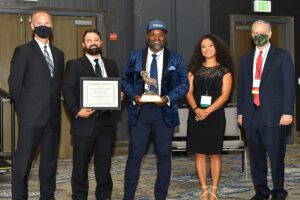
Black Folks Camp Too, Conservation Organization of the Year, Earl Hunter, Steven Reinhold and Raileigh Duschen
Earl B. Hunter, Jr., founder and president
When his son was 7 years old, Earl B. Hunter, Jr. took him on a camping trip across the US and Canada. While they were struck with the beauty and grandeur of the North American landscape, they were more taken with something else: In three months, 49 campgrounds and 20 states and provinces, they only saw one other Black family camping.
In 2019, Hunter started Black Folks Camp Too as a movement, initiative, social media outreach and a whatever-it-takes mechanism to open up camping. At the heart of Black Folks Camp Too is “the belief that as more Black folks become more active campers and begin enjoying the outdoor lifestyle, barriers will be broken down to create more inclusive communities and stronger relationships overall.”
The company assists in removing fears, adding knowledge, inviting more Black families to build memories and strengthen family bonds, and expanding the camping consumer base to help energize the outdoor industry economy.
“The outdoors saved my life. I found freedom in the outdoors. If you’ve been outdoors, you know you haven’t seen many folks who look like me. And there are reasons. There is generational fear. We have a lack of knowledge, and we have a lack of invitation,” Hunter said. “And my job as the founder and president of Black Folks Camp Too is to make sure that the folks who look like me – my children and my children’s children – can experience these beautiful 640 million acres of public land that we all collectively own.”
He added, “Folks in this audience are going to have to help us. And if you don’t help us, then all the work you’ve done to conserve all this beautiful land, all these beautiful animals, and all these things, when you’re gone, it’ll all go to waste. Because there are folks out there that have no clue on why the outdoors is so important to me, and to you.”
Rep. John Bell, Legislator of the Year (Goldsboro)
House Majority Leader and District 10 Representative
John Bell represents a swath of North Carolina latticed with rivers and streams. It’s a largely rural landscape where rising waters can wipe out farmers’ fields and flood small towns and big cities alike.
During the 2021-22 legislative session, Bell introduced the Disaster Relief and Mitigation Act of 2021 (HB 500), a first-of-its-kind bill to fund wetland and floodplain protection and restoration. The bill would help reduce the devastating effects of flooding in communities while protecting and preserving the natural resources, wetlands and waterways that provide critical habitat and opportunities for hunting, fishing and other outdoor recreation.
“As a lifelong sportsman, I have proudly worked to promote hunting and fishing traditions while protecting and conserving our state’s natural resources and wildlife. This includes working on a proactive approach to prevent flooding and make our state more resilient,” Bell said. “I’m pleased to announce this resulted in a $300 million flood mitigation package in the budget that will be the largest and most comprehensive statewide investment that North Carolina has ever made to address flooding and prepare for future disasters.”
Leaf & Limb, Business Conservationist of the Year (Raleigh)
Basil Camu, owner
In 2017, tree service company Leaf & Limb came to a startling revelation that half of their business came from cutting down trees, just as owner Basil Camu was becoming more deeply aware that trees are essential to the planet’s health. That year, Leaf & Limb shifted from tree removal to tree preservation and habitat restoration through plantings, healing the soil and maintaining existing trees for long-term success and wildlife. The company initiated Project Pando, which has evolved into a volunteer-driven tree farm providing free trees to the public to improve local ecosystems.
From January 2017 to March 2020, Leaf & Limb volunteers donated 3,805 hours for Keep Durham Beautiful, Triangle Land Conservancy, Raleigh City Farm, Farmer Foodshare, and NC Museum of Life and Science.
“Unfortunately, we’re facing a litany of environmental disasters (but) by fostering and promoting natural systems, we can begin healing our ecosystems,” said Camu at the banquet. “But by planting billions of trees and by caring for the trees we have, we can begin overcoming these pressing environmental issues.”
Dr. Nils Peterson, Natural Resources Scientist of the Year (Raleigh)
Professor and Interim Director, North Carolina State University, Fisheries, Wildlife and Conservation Biology Graduate Program
Dr. Nils Peterson is a wildlife biologist specializing in human relationships with wildlife and human attitudes about wildlife and land conservation. His work covers hunter ethics, underserved populations and their interactions with wildlife management, gender differences in attitudes about wildlife, and how exposing children to conservation principles increases conservation awareness in parents.
“He knows you can’t make masters and Ph.D. students without first inspiring and mentoring wide-eyed freshmen, which helps explain why he’s still an avid advisor for the Leopold Club, a student chapter of The Wildlife Society,” Nickens said.
During his thank-you speech, Peterson recognized those who mentored him and gave him opportunities and support for wildlife conservation and resource research. He also acknowledged the students he works with, saying “scientific endeavors are built on their backs” and “it’s their blood, sweat and tears that make it happen.”
Added Nickens, “Ours is a world in which deer and bears are increasingly common visitors to the Wolfpack campus. That’s a metaphor for how inextricably wound human lives have become with the so-called wild lives that exist beyond the sidewalk.”
Ernie McLaney, Wildlife Volunteer of the Year (Charlotte)
Charlotte Wildlife Stewards
Ernie McLaney “lives and breathes conservation and sustainability every day” while donating his time, energy and resources to preserving wild lives and wild places in North Carolina.
“It’s difficult to enumerate in just a few words the countless hours Ernie spends in public meetings and public speaking and behind the scenes and one-on-one, working for conservation,” Nickens said. “Between his volunteer work for the National Wildlife Federation, North Carolina Wildlife Federation and Charlotte Wildlife Stewards, to name a few, Ernie seems to work three full-time jobs all at once. And all while being retired.”
McLaney served as the first executive director of the Center for Sustainability at Central Piedmont Community College, co-founded Charlotte Wildlife Stewards in 2013, and served as its chapter president for five years. He also served two years as vice president of the Habitat and Wildlife Keepers chapter. Additionally, McLaney was part of the leadership team that certified Matthews as a National Wildlife Federation Community Wildlife Habitat in 2012. He worked in a similar capacity to certify the City of Charlotte as a Community Wildlife Habitat in 2015.
“Ernie is constantly exploring ways to nourish the environment, spread awareness to future generations and promote sustainable practices,” Nickens said. “Whether it’s by contacting local politicians, picking up roadside trash or leading kayak and hiking trips, he is a tireless advocate for living things that have no voice of their own. He is an inspiration, mentor, leader and follower.”
During his acceptance speech, McLaney noted North Carolina’s State Constitution on the conservation of natural resources (Article XIV, Sec. 5). “We need a lot more volunteers to help organizations like the North Carolina Wildlife Federation keep our decision-makers on the powerful message that article contains,” he said. “I volunteer for NCWF because I truly feel pure joy when I witness wildlife in their natural habitat. And I hope someone else that I work with, talk to or do a project with will pick up the stewardship passion in their core and continue it after I’m gone.”
McLaney asked the attendees to join him and step up their volunteer efforts with a renewed focus on wildlife conservation and introduce others in their community to the importance of the natural world. “I want to leave you with this quote from Martin Luther King, Jr.,” he said. “Volunteering is the ultimate exercise in democracy. You vote in the elections once a year, but when you volunteer, you vote every day for the type of community you want to live in.”
NC Rep. Hugh A. Blackwell, Public Lands Conservationist of the Year (Valdese)
NC Representative of District 86 in Burke County
Since 2009, North Carolina Rep. Hugh A. Blackwell has been a “true trailblazer” and “champion for increasing public trails and state parks.” From his first day on the job in the General Assembly, the retired attorney who lives in Burke County has inspired North Carolinians to experience wild places by working to increase public trails and state parks.
“Rep. Blackwell knows what John Muir knew: Conservation starts with learning to love the outdoors – and love taking care of the outdoors – literally one step at a time,” Nickens said.
Blackwell’s work to establish the Fonta Flora State Trail and others raised the number of state trails from six to nine while preserving thousands of acres in the process. He has championed the Overmountain Victory State Trail, Wilderness Gateway State Trail, the effort to designate 2023 as the Year of the Trail in North Carolina, and has been a steadfast supporter of funding for the state’s conservation trust funds.
“I really do appreciate this award. I’m thinking about the work (NCWF has) done as an organization and all of the people across the state who work in conservation efforts for public lands; for me to be singled out makes me feel a little inadequate,” Blackwell said. “In addition, it almost seems like cheating to get an award for doing things that are both fun and satisfying.”
Cape Fear Garden Club, NCWF Affiliate of the Year (Wilmington)
Cape Fear Garden Club was formed in 1925 and has been sowing seeds -metaphorically and literally – throughout Wilmington and New Hanover County. During the recent pandemic, the need for social distancing curtailed some of the club’s outstanding work, like the annual garden tours, but the club didn’t just fold the tents, Nickens said. Instead, the club focused on its “roots,” planting organic and sustainable backyard and community gardens filled with herbs, flowers and plants that benefit birds, pollinators and wildlife.
“There’s something particularly nurturing about planting a garden for wildlife,” he said. “So many people have found that providing resources for birds and butterflies also provides solace and strength to gardening.”
Since education is the cornerstone of the conservation process, members also wrote a plan and hired a videographer to create videos to inspire those who want to establish healthy habitats, attract wildlife and turn their outdoor space into a Certified Wildlife Habitat. Housed on the club’s YouTube channel, the videos cover four categories of certification: providing food, supplying water, creating cover and giving wildlife a place to raise their young.
“We really appreciate this. When we did the video we were just having so much fun doing what we normally do – going outside and working in a garden – and it was our way of giving back,” said Mary Smith, adding “so go ahead and get garden certified!”
Concord Wildlife Alliance, NCWF Chapter of the Year (Concord)
“The Concord Wildlife Alliance inspired us with their creativity in pushing conservation forward when the Earth itself seemed to stop spinning,” Nickens said. “They collaborated and socially distanced and cared for the well-being of their fellow man while flat out getting it done for wildlife.”
In 2020, the chapter partnered with city and county officials and local organizations to certify 63 Community Wildlife Habitats and seven schoolyard habitats. Additionally, they collected 400 pounds of trash, hosted an Adopt-A-Stream cleanup, restored habitat affected by an emerald ash borer infestation, and planted native trees and shrubs.
When President Sarina Dellinger and Past President Glenda Steel accepted the award, they gave special thanks to City of Concord Mayor Bill Dusch, who also attended the event. “We would not be here without our partners who are here with us tonight,” Steel said. “The City of Concord has been a strong supporter from day one, as have our county and city parks and recreation departments, local corporations and the Concord Youth Council.”
Master Officer John M. Howell, II, Wildlife Enforcement Officer of the Year (Salisbury)
North Carolina Wildlife Resources Commission
Officer Howell takes a caring and innovative approach to protecting wildlife resources in Rowan County, whether he’s on or off the clock with the North Carolina Wildlife Resources Commission. He also connects with his local community in a non-threatening manner, said Nickens, who shared a story about a Latino angler Howell recognized fishing on the bank near the dam at High Rock Lake.
Howell invited the man on his boat, where they fished together and talked about fishing regulations and cultural barriers between the Latino community and NCWRC. The two ended up shooting a video on fishing rules and regulations for a Spanish-language YouTube Channel the fisherman ran. The impromptu collaboration resulted in a reduction in fishing violations in that area.
“I grew up hunting and fishing, and this is pretty much the only career path that I’ve ever had in mind,” said Howell, who joined the agency about three months before his father, also a wildlife officer, retired. “I’m just very honored that I get to protect the resources that I love so much every day so that my children can enjoy it the way that I enjoyed it.”
Sgt. Odell Williams, Marine Enforcement Officer of the Year (Swan Quarter)
North Carolina Marine Patrol
Born and bred eastern North Carolinian, Sgt. Williams’ career began with the North Carolina Marine Patrol running the agency’s 48-foot patrol vessel Roanoke out of the Oregon Inlet in Nags Head. Williams, who lives near Swan Quarter, continues to ardently protect the marine resources of his home region and state.
Last year in Hyde County, he made many notable cases, including a significant seizure of illegally caught striped bass with a replacement valued at more than $250K. When his district’s captain retired this past year, he filled the 6-month gap by working in the field in vacant officer positions.
“He held multiple titles this past year and carried the torch for at least four positions,” Nickens said. “And I’d bet if you asked Williams why he picked up the slack and never complained and went out of his way to help out every chance he could, he’d say, ‘Well, that’s how they do it where I come from.’”
Event sponsors support conservation heroes
Thank you to the following partners, businesses and individuals for helping us honor and celebrate North Carolina’s top-notch conservation leaders of 2021.
- Diamond sponsors: Duke Energy/Piedmont Natural Gas
- Platinum sponsors: John Robbins, North Carolina Electric Membership Cooperatives (NCEMC)
- Gold sponsor: Truist
- Silver sponsors: The LDH Group, Parker Poe, The Rutledge Family
- Bronze sponsors: Concord Engineering & Surveying, Inc., Congressional Sportsmen’s Foundation, Higgins Bottom, PLLC, Martin Marietta, N.C. League of Conservation Voters, Knight Consulting, Kristine and Jason Goodyear, Vulcan Materials


